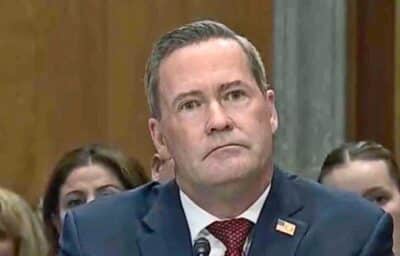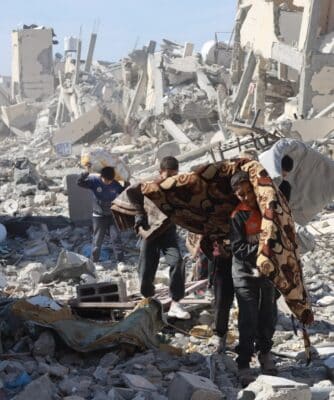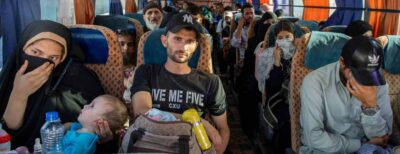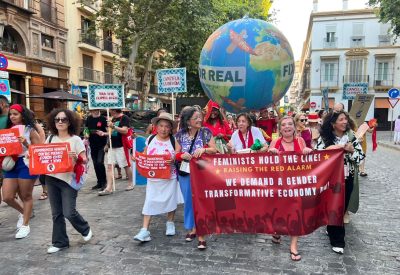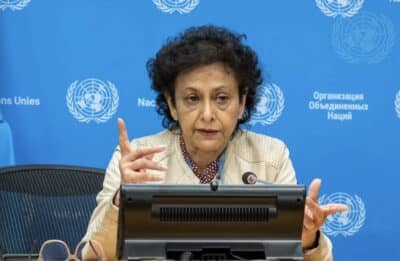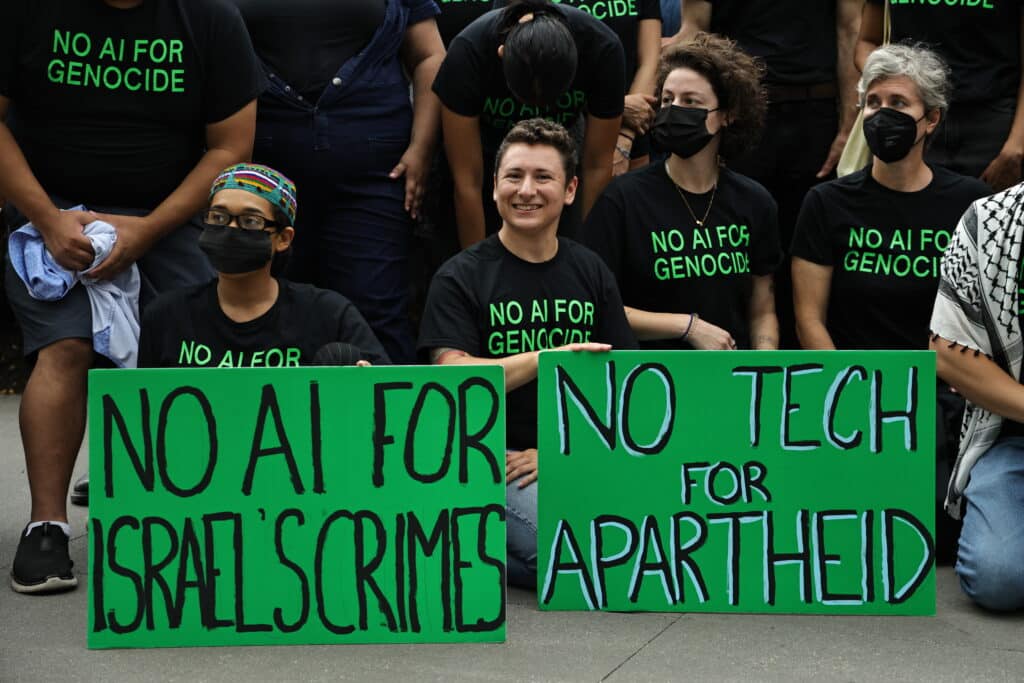
This Week @UN: Saving UNRWA; free speech/hate speech; Waltz weaponizes US aid; Pakistan’s push for Kashmir vote.
Plus: SDG gains/laggards; big-tech protests @UN; Syria infighting; Israel bans swimming in Gaza; Colombia’s rocky peace; nukes’ effects.
Stay on top of the world with PassBlue via Blue Sky, Twitter (X), Facebook, Instagram and LinkedIn
• Our #1 story this week & month: Mike Waltz Wants U Aid Tied to Voting Loyalty in UN, by Damilola Banjo
• The race to lead the UN Development Program is attracting some of its top donors, and though the selection process remains as murky as brackish seawater, critics question whether candidates that are also UN officials represent a conflict of interest. According to Development Today News, an independent journal specializing in Nordic aid and other issues, these are the current job-seekers: Izumi Nakamitsu of Japan, who heads the UN’s Disarmament Affairs office; Chrysoula Zacharopoulou of France, a former French development minister; Alexander De Croo of Belgium, a former prime minister; and Jens Wandel of Denmark, a special adviser to UN Secretary-General António Guterres (working on the UN80 reform initiative). Bard Vegar Solhjell of Norway has withdrawn his candidacy. Additionally, a UN source told PassBlue that Oscar Fernández-Taranco of Argentina, who leads the Development Coordination Office, is applying, but he said in an email on July 18 that he is not. — DULCIE LEIMBACH
US-UN Tracker
• On July 16, the same day that a deadly stampede occurred at a Gaza Humanitarian Foundation, or GHF, aid hub killed at least 19 people, the UN Security Council later met on Gaza. Dorothy Shea, US acting representative to the UN, said: “I want to state that we are aware of reports of fatalities at a GHF site in Khan Younis. And the United States mourns this loss of life. The GHF stated it confiscated weapons at the site and has credible reason to believe that elements within the crowd – armed and affiliated with Hamas – deliberately fomented the unrest.”
She added that “while no mechanism is perfect, this is a good one, and it is continuously getting better. And the UN should help it do so.”
Yet, the controversy over the US-Israeli backed GHF since it began operating in late May isn’t letting up: the stance of nearly all members in the recent Security Council meeting was clear, as some diplomats even called the hubs “death traps.” Tom Fletcher, the UN emergency relief chief, said of the aid situation that “we do not need to debate whether killing civilians waiting in line for life’s essentials meets the responsibility to provide for civilian needs.” France’s envoy called the deaths at GHF hubs “unconscionable.”
As the UN reported that 875 people have died in recent weeks trying to access food in Gaza, Chapin Fay, the GHF spokesperson, told reporters on July 16 that Hamas is inciting unrest in the crowds surging in the vicinity of the hubs, though he provided no visual or other underlying evidence. He added that “at no point was tear gas deployed, nor were shots fired into the crowd” in the stampede. Warning shots were fired in the air and “limited use of pepper spray was deployed, only to safeguard additional loss of life.”
The independent media site Drop News has a starkly different account of the stampede, reported from Gazans at the Khan Younis site, saying: “Then, according to eyewitnesses, GHF guards stationed nearby threw stun grenades and used pepper spray on the crowd, causing mayhem.”
One Gazan said: “The Americans were spraying pepper gas at us; it burns and affects the nervous system of the human body. You just can’t handle it. You’re under pressure. The people are all pushed together and all trampling on each other. There is no air and you feel shortness of breath—everyone wants to go get their food.”
As the controversy over the hubs continues, the International Crisis Group says that pressure is increasing as US Congress wants answers from GHF. Forensic Architecture’s new analysis shows “how Israel has imposed a deadly aid system through GHF ration stations, while dismantling a proven civilian-led model, in order to concentrate Palestinians in Rafah and push Gazan society toward collapse.” And on July 18, Israel reportedly declined to renew the visa of Jonathan Whittall, head of UNOCHA in occupied Palestinian territories. — DULCIE LEIMBACH
From PassBlue this week:
• Saving UNRWA and Keeping the UN’s Promise to Palestine Refugees, op-ed by Mona Ali Khalil
• The Landmines Between Free Speech and Hate Speech: Q/A With UN Expert, by Ilgin Yorulmaz
• Mike Waltz Wants US Aid Tied to Voting Loyalty in UN, by Damilola Banjo
• Pakistan: Carry Out the Vote on Kashmir’s Fate, exclusive video interview with Pakistan’s UN envoy, produced by Damilola Banjo and Femi Olusanya
Top UN news:
Monday, July 14
• No spokesperson’s briefing. Instead, Guterres held a press conference, in which he highlighted progress and the lack thereof in his 2025 report on the 2030 Agenda for Sustainable Development (SDGs). Millions of people have gained access to electricity, clean cooking and the Internet, while women’s access to education and political representation across society are rising. But he warned that only 35 percent of SDG targets were on track or making moderate progress and 18 percent are “going in reverse.” Guterres noted that 800 million people still live in extreme poverty in “intensifying climate impacts” and that relentless debt service is draining resources crucial to countries’ progress, constituting a “global development emergency” that drives conflicts. He called for resolutions to the wars in Gaza, Sudan and Ukraine.
Tuesday, July 15
• Spokesperson’s briefing: In response to a reporter’s question about demonstrators outside the UN who were protesting tech companies enabling Israel’s war in Gaza, based on a recent report by Francesca Albanese, UN special rapporteur on the occupied Palestinian territories, UN spokesperson Stéphane Dujarric said the UN expects “all our vendors” to “behave in a way that meets the code of conduct that is specified” in the UN Charter and the Universal Declaration of Human Rights. Asked whether the UN will still work with the companies listed in Albanese’s report, such as Google and Microsoft, Dujarric said this was “what I’ll say for the time being.” (He also said he was unaware of the protests at the UN.)
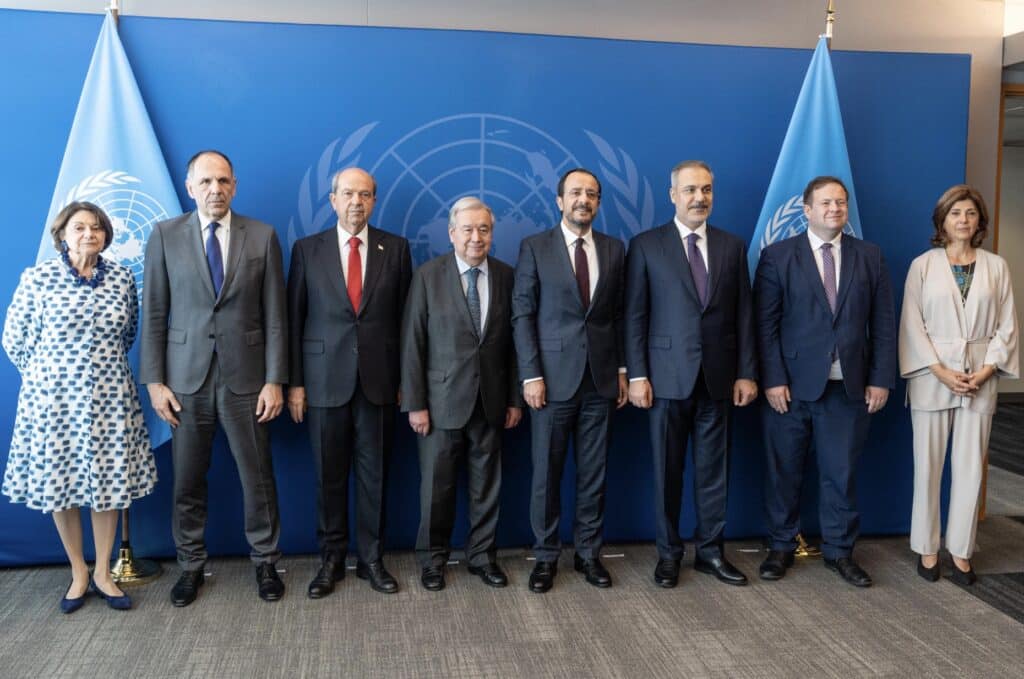
Wednesday, July 16
• Spokesperson’s briefing: Guterres “unequivocally condemns” the continued escalation of violence, including against against civilians and arbitrary killings, in the Syrian city of Sweida, which have reportedly killed hundreds of people and intensified sectarian tensions hindering Syrians’ “opportunity for peace and for reconciliation.” While noting Syrian Interim President Ahmed al-Sharaa’s statement condemning the violence and announcing a probe to identify the perpetrators, Guterres said the main responsibility to protect all Syrians “is that of the government of Syria.” Guterres also condemned Israel’s airstrikes in Sweida, Daraa and the capital of Damascus as well as the redeployment of Israeli military forces in the Golan Heights, calling for the “immediate cessation of all violations of Syria’s sovereignty and territorial integrity and for respect of the 1974 Disengagement of Forces Agreement.”
[Update, July 17: Khaled Khiari, UN assistant secretary-general for the Middle East, Asia and the Pacific, briefed the Security Council on Sweida]
Thursday, July 17
• Spokesperson’s briefing: Gazans have been “hesitant to bathe” in the Mediterranean Sea this week, after the latest Israeli ban on access to the coast, including for fishing and swimming, depriving many people of their only option to wash amid the hot weather as the enclave has “barely any functioning water infrastructure and almost no fuel to pump water,” Stéphanie Tremblay, associate spokesperson, said.
• Guang Cong of China is the new UN special envoy for the Horn of Africa.
Friday, July 18
• Spokesperson’s briefing: Carloz Ruiz Massieu, Guterres’s special representative for Colombia, told the Security Council that the implementation of the country’s peace agreement “continues to face serious challenges,” because of the “limited presence of State institutions in some regions” and the “proliferation of armed groups and tenacity of illicit companies and violence.” Ruiz emphasized the international community’s “vital role” in securing peace for Colombians “as important as ever.”
• Guterres tasked an independent, 21-member panel of experts with “examining the physical effects and societal consequences of a nuclear war on a local, regional and planetary scale,” as mandated by a General Assembly resolution in December 2024 (only three countries voted against it: Britain, France and Russia; US didn’t vote.) The panel’s first meeting is scheduled to start in September, with a final report due to the Assembly in 2027.
ICYMI:
• Ukraine joins the ICC as a state party
• UN80: An Explainer (Project Starling report)
• Unesco’s new World Heritage List
• Declining Information Quality Under New Platform Governance: report from Shorenstein Center on Media, Politics and Public Policy (Harvard Kennedy School)
Arthur Bassas is a researcher and writer who graduated from St. Andrews in Scotland, majoring in international relations and terrorism. He lives in Brooklyn, N.Y., and speaks English and French.



